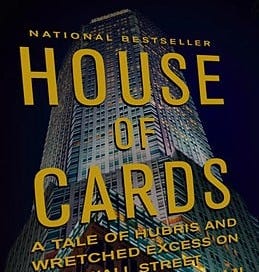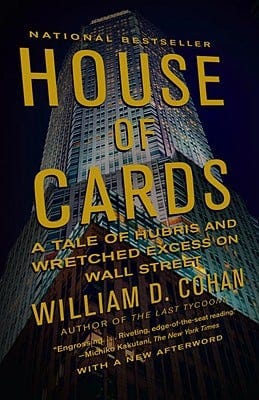I’m two-thirds of the way through the banker trifecta of books by William D. Cohan. I read The Last Tycoons previously and just finished House of Cards. Next up is Money and Power. House of Cards has the subhead of A Tale Of Hubris And Wretched Excess On Wall Street. When I hear the phrase house of cards, my brain goes to the towers we made as kids, carefully stacking layer after layer playing cards, until the inevitable crash. If you are playing that game, you know the collapse is coming but you don’t know when, that is part of the thrill, a low-stakes drama. The book is about high stakes, the rise and eventually fall of Bear Stearns.
I’ve never enjoyed card games. I played as a kid, of course, but my inability to understand social cues always made it hard. And I don’t have ruthlessness. I don’t want to win, I don’t bet big, I’m not methodical. Business, however, loves cards. People always talk about business being done over golf, and that happens, too but watching someone play cards teaches you a lot more about their style. Poker is the obvious choice for entrepreneurs with its focus on risk and bluffing, the idea that you can either amplify or mitigate your luck by lying.
The card game behind Bear Stearns is bridge. I know very little about bridge but it was the social currency of choice for many post-war adults. Bridge requires a partner and a close understanding between the partners in order to succeed at the game. Jimmy Cayne, who ascended to CEO at Bear Stearns, partly got in the door because he was one of the country’s best bridge players and his interviewer, Ace Greenberg wanted to be better at bridge. Greenberg also had a knack for choosing men (yes, again, usually men) who were strivers. He didn’t want the Ivy League legacies, he wanted the hungry men who were willing to both work harder and charm harder. Cayne was both.
Over the years, the two became bridge partners and eventually business adversaries as they both jockeyed for position inside Bear Stearns. It was the usual battle for money and power (the title, not coincidentally of Cohan’s book about Goldman Sachs which I’m reading next). Bear Stearns has been held up as the scapegoat for financial mayhem during the financial crisis but they weren’t necessarily doing anything different than many other places, they just did more of it.
Hubris is a tricky word and Cohan’s use of it in the subtitle is worth paying attention to. As a child reading Greek myths, I was more afraid of hubris than of sin. Hubris could sneak up on you, masking itself as confidence and capability until at some point, you are challenging the gods, and destruction ensues. Cayne’s hubris came partially from not understanding that all games end, that your turn passes. Had he played poker, maybe he would have left the table earlier.
I’m thinking a lot about games lately, especially Elon Musk’s obsessive playing of video games and what that means for his thinking. Certainly, it accustoms him to risk. He’s able to lose rockets, people, and money because he’s focused on the goal ahead. If bridge teaches you to pay attention to humanity, many video games force you to do the opposite; you may play beside others, but you don’t necessarily need them. I don’t know enough about esports compared to traditional sports to understand how teamwork is developed.
Our culture spends a lot of time handwringing about social media as it has evolved from a community engagement tool to a broadcast platform. We spend less time talking about video games and how they have changed culture, not just the big dramatic games but the small ones people play on their phones, the tiny worlds we tuck ourselves into.
If mostly poker, bridge (and yes, golf) built the leaders we have had and we are transitioning to a world led by video game players, what does that mean for our future? Could it be one built on a greater understanding of larger issues at stake, or will it be one of sacrifice of the many for the glory of the few? What does it mean when most of our interactions are with technology? This piece from Sigal Samuel at Vox gets to some of what worries me, a loss of a humanity as a whole. It makes me long for a card game.






Deidre- I like your deconstruction of money matters when it relates to systemic cultures—Wall Street or otherwise. Sacrifice of the many for the glory of the few has always been the currency. So this is a refreshing re-look into this world.